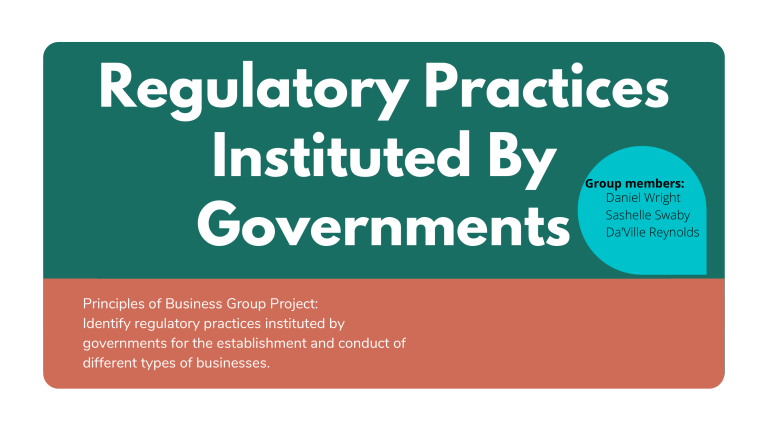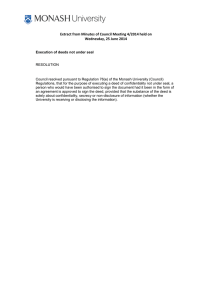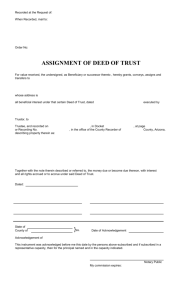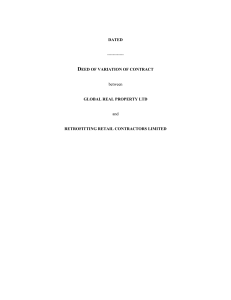
Regulatory Practices Instituted By Governments Group members: Daniel Wright Sashelle Swaby Da'Ville Reynolds Principles of Business Group Project: Identify regulatory practices instituted by governments for the establishment and conduct of different types of businesses. What are Regulatory Practices? Regulatory practices can be defined as rules and laws persons must act in accordance with when establishing and conducting the business The Importance of regulatory practices: Consistency in the implementation of good regulatory practices, as well as adaptation to the current challenges, result in high ethical and scientific standards. This will ultimately have a positive impact on public health at the global level. "Examples of Regulatory Practices Include:" Safety and Health The Safety and Health Act of 1970 ensures that employers provide safe and sanitary work environments through frequent inspections and a grading scale. A company must meet specific standards in order to stay in business. This regulation has changed frequently throughout the years alongside the changing sanitary and workplace standards. In accordance with the 1970 act, employers must provide hazardfree workplaces, avoiding employee physical harm and death, through a number of procedures. License Persons who are engaged in trades, such as electricians and plumbers, must be licensed. Some are required to sit and pass examinations which qualify them to receive their licences and practise unsupervised. Data Security and Privacy Protection Sensitive information is usually collected from employees and customers during hiring and business transactions, and privacy laws prevent businesses from disclosing this information freely. Information collected can include social security number, address, name, health conditions, credit card and bank numbers and personal history. Not only do various laws exist to keep businesses from spreading this information, but people can sue companies for disclosing sensitive information. The Federal Trade Commission monitors business practices and charges or fines companies that violate the privacy promises they made to consumers. For example, when a company promises not to use their information in ways other than what is stated, or shares their private information without consent, or monitors customers' online, mobile and/or television habits without informing them in advance, the FTC charges them publicly with such offenses, levies hefty fines and forces the business to change their unethical practices. Environment al Impact of Businesses The carbon footprint and the effect of businesses on the environment is regulated by the Environmental Protection Agency alongside state agencies. The EPA enforces environmental laws passed by the federal government through educational resources, frequent inspections and local agency accountability. The Environmental Compliance Assistance Guide exists to help businesses, small and large alike, achieve environmental compliance, and serves as an educational resource more than an enforcer. Required to register Private and public limited companies are required to register with the Registrar of Companies and to present the documents required. Included is the very important document, articles of incorporation, which has replaced the memorandum of association and the articles of association. A private company may be formed with one person, or may have up to 50. Regulations regarding a Sole Trader As far as the sole trader is concerned, there are very few regulations in the setting up of a business. In fact, many sole- trader type businesses do not have any requirements to satisfy at all. A few might be required to have permits or licences in order to operate businesses. Required to register Private and public limited companies are required to register with the Registrar of Companies and to present the documents required. Included is the very important document, articles of incorporation, which has replaced the memorandum of association and the articles of association. A private company may be formed with one person, or may have up to 50. The partnerships should have a minimum of two partners and a maximum of 20. In setting up a partnership, a partnership deed, or Deed of Partnership, should be drawn up. This document includes the name of the business, names and other occupations of the partners, and statements as to how profits and losses will be shared. The document may be drawn up by a lawyer, but it is not madatory. The Deed of Partnership should be taken to the Companies Office of Jamaica, who will give permission for them to operate the partnership if everything is in order. If a partnership is set up and there is not Partnership Deed, then the partners will make reference to the British Partnership Act 1809 which indicates that all profits and losses should be shared equally. The Deed of Partnership Cooperatives Should Register With the registrar of Co-operative Societies. They are required to pay a small fee. They should operate the co-operative based on the five cooperative principles. Businesses on a whole must endeavor to do their part in upholding the monetary and fiscal policies of the government of the day. They should also work closely with the government protection agencies such as the Bureau of Standards, the Consumer Affairs Commission and the ombudsman. "End of Presentation" On the regulatory practices of Governments


